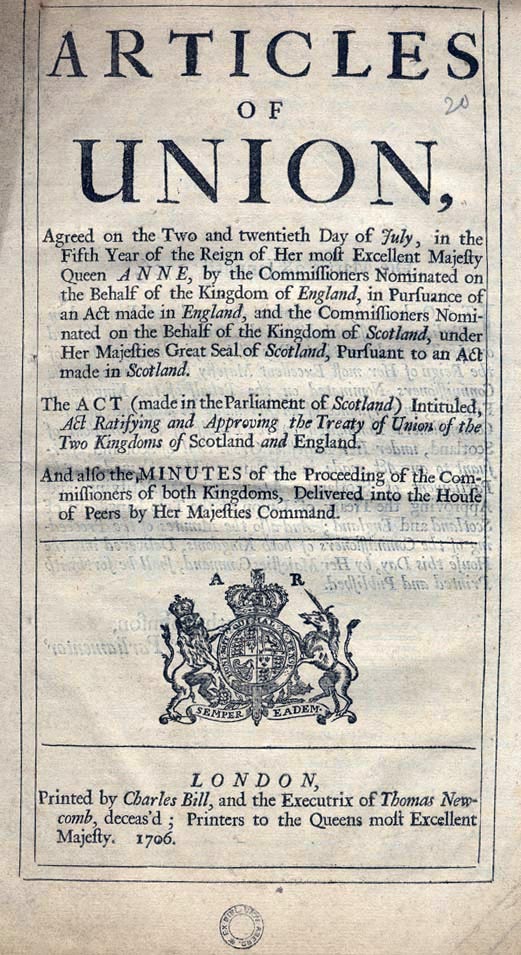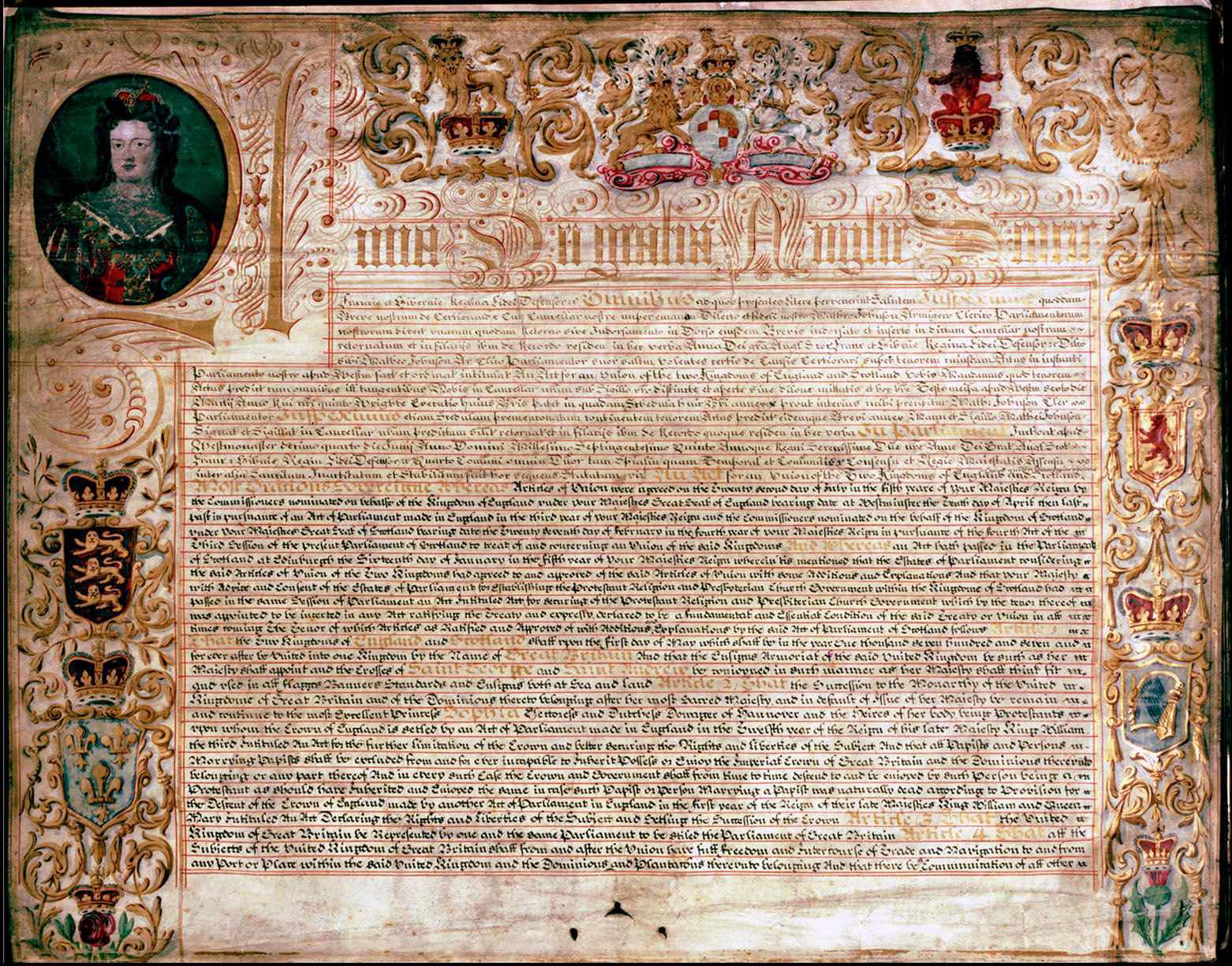The Treaty of Union – 1707by Tom Doran History can and does have big moments – but most people see those in a vacuum, not realizing that there is a long and often tortured road to get to that moment in time – to those BIG moments.
Scotland’s referendum on independence is one of those big moments, perhaps one of the biggest in its history – but the trail it leaves behind goes back centuries if not indeed a millennium. Do we need to know where we’ve been to know where we are going? Were the Romans responsible for the almost physical partitioning of Caledonia from the rest of the island? Would the borders have been different had it not been for them? Scotland did control the countryside past the modern border and fought hard and often for Berwick alone for instance over many years. But the fortunes of war and of the nobility and other landed-gentry also moved imaginary lines as well as ethnic identity and culture. If invaders from Ireland had never made such a strong hold on the country, would it be Pictland and not Scotland asking for independence (if they would have ever sold it away that is). What about the Norwegians? Are the Shetlands and Orkneys going to go their own way – given the ages old cultural differences between the Islands and the Mainland? For simplicity’s sake, the issues that led to the eventual Treaty of Union began not just with the shared nobility but in a disastrous adventure now referred to as the Darien Scheme. We covered this in some details, so please click the link to get details for they figure greatly into this article. In the early 18th century, with the union of the crowns already a centuries old established fact, the next step, to some in power at least, was the actual, legal union of Scotland and England. It seemed not only inevitable, but desired. By some. Scottish rulers have often envied the riches (comparatively so) of the English court and many who had a claim would never have been truly happy had they not held the English crown as well. But the utter destitution of the people of Scotland, caused by the Darien disaster (and other, very direct English interference), made the union ripe and ready to happen. The once rich could now see a way out if the English agreed to take over the debts – and the royals and other nobility? Well, they were never popular with the majority of the population, who saw the rich only out for themselves. In the Highlands, people’s loyalties were much more direct – to their family and clan. The King (or Queen) always came in second in that popularity contest. The nobles saw only benefits for themselves. Though there were months and months of hard debate – the actual outcome never seemed in doubt once the discussions began in earnest. It was only the details to be worked out. In the end, the treaty was ratified, (with such safeguards as English troops massed just near the border for a little extra incentive to “do the right thing.”) and the independent Kingdom of Scotland ceased to legally exist. In fact the very first article says that the union of England and Scotland shall a “...forever after, be United into One Kingdom by the Name of Great Britain.” In reality for most of the resultant history, Britain has more often than not been referred to as England. Not by everyone, but enough to certainly confuse the issue. The negotiations also settled the issue of the royal succession – assuring ultimately a Hanoverian legacy, and only a Protestant ruler as well. Leaving out the Stuarts (who often were closet if not in fact, Catholics) all together. While the nobility and those commercial interests were happy with the arrangement, the people of Scotland were decidedly NOT. There was rioting on a large scale, and it is certain that the vast majority of the common folk were wildly and violently against the union (even the English author Daniel Defoe, acting as an English spy, sent word back that “...not one in a hundred...” was for the union. The common people had no legal say – and could not vote on the matter at hand. Robert Burns famously wrote decades later his famous piece, “Such a Parcel of Rogues in a Nation”, which was seen as an expression of many of the Scottish people – that their beloved Scotland was “...bought and sold for English gold”. Fareweel to a' our Scottish fame, Fareweel our ancient glory; Fareweel ev'n to the Scottish name, Sae fam'd in martial story. Now Sark rins over Solway sands, An' Tweed rins to the ocean, To mark where England's province stands - Such a parcel of rogues in a nation! What force or guile could not subdue, Thro' many warlike ages, Is wrought now by a coward few, For hireling traitor's wages. The English steel we could disdain, Secure in valour's station; But English gold has been our bane - Such a parcel of rogues in a nation! O would, ere I had seen the day That Treason thus could sell us, My auld grey head had lien in clay, Wi' Bruce and loyal Wallace! But pith and power, till my last hour, I'll mak this declaration; We're bought and sold for English gold - Such a parcel of rogues in a nation! Though there were many things left in place for Scotland to feel secure in the new union: independent legal system, education, religion, etc., equality in taxation, trade regulations, etc., many of those elements and articles have been violated, and in several cases completely done away with over time. According to some websites, which I will quote here, “...since 1707 there have been numerous breaches of this Treaty, which lead to the conclusion that the treaty has become void and invalid.
Out of the original 25 Articles of the Treaty, 9 have been wholly repealed by Westminster, and 5 have been materially altered.” So, now comes the real test – will Scotland, in this new age, vote to restore their status as a once-again independent nation. In an era when old treaties and regulations have vanished in many places across the world – not necessarily by political design (but that can’t be ignored when corporations and money rules even political decision making as it always have, albeit in a different manner), but by commercial realities, and a natural progression of life and outlook, and the immense changes new technology has rapidly, very rapidly, changed how we live our lives, react and relation to others and to the rest of the world. Indeed perceive how we see ourselves in that new world. What is necessary for a perception of dignity, for cultural survival, commercial interests fine-tuned down to a local level (who was it who said “All politics are local”), and what does this mean to the Scots today? We will soon see if, for possibly the first time in recorded history, a country votes to deny a reestablishment of its own independence – or forges boldly ahead into new and uncharted territory. Scotland’s big moment is at hand. |

